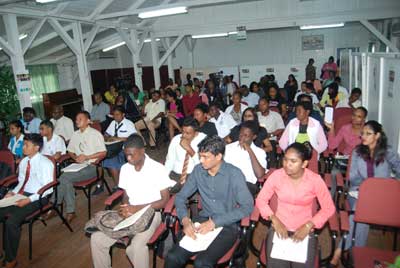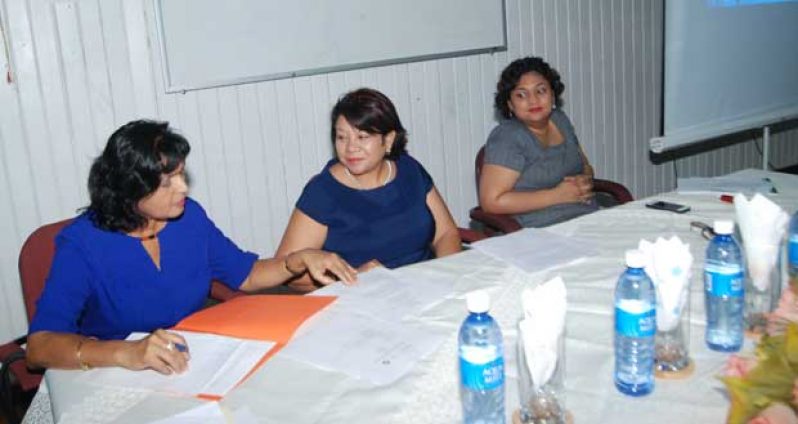SAGICOR Visionaries Challenge 2014, the second annual Sagicor Visionaries Challenge contest for secondary school students, was launched on Wednesday at the National Centre for Educational Resource Development (NCRED), Battery Road, Kingston, Georgetown.

The contest seeks to engage high school students to solve problems facing their schools and communities, using Science, Technology, Engineering and Mathematics (STEM).
The contest also aims to ignite interest among youth for innovation in STEM in an effort to build and integrate sustainable communities throughout the Caribbean, and integrate knowledge gained from formal and informal education to enable tomorrow’s leaders to build a more sustainable Caribbean.
This year’s challenge will include students in Antigua & Barbuda, Barbados, Belize, Dominica, Guyana, Hillsborough County – Tampa, Florida, St. Lucia and Trinidad and Tobago.
National competitions will take place in November 2014, and one representative from each winning team will travel to Tampa, Florida for the STEM Ambassador Programme in July 2015.
IMPRESSED
Speaking at the Sagicor Visionaries Challenge 2014 launch yesterday, Minister of Education Priya Manickchand said that measures will continue to be taken to improve performance in STEM, areas that often present a challenge to students. Manickchand stated that she was deeply impressed with the progress she saw from the 2013 challenge. Secondary school students entering the Sagicor Visionaries Challenge had the chance to design a sustainable solution to a problem facing their school or community.
ZEEBURG SECONDARY
In Sagicor Visionaries Challenge 2013, Zeeburg Secondary School emerged the overall winner in the Guyana finals of the Sagicor Visionaries Challenge Competition, copping the national award from among 19 schools which submitted a total of 32 projects for judging.
“Here was a group of young people from a particular committee, identifying a problem that was affecting not only the school but the community for many years… and I was deeply impressed by that. I particularly liked this whole concept of Sagicor – it really brings science to life,” she said.
Zeeburg dominated the competition, last year, with its entry: ‘Use of a Shrimp Drier to reduce air pollution.’ The winning project submitted by Zeeburg aimed at reducing air-pollution in the community, brought on by the primitive method of sun-drying fish and shrimp. The method used is both hazardous to the health of residents of the community, more so the school located nearby. The school had complained of being greatly affected by the odour and attendant fly infestation.
The competition, the team said, presented the ideal opportunity for them to brainstorm and come up with an innovative project (a mechanical shrimp drier) that would bring relief to both the school and the wider community affected by current method of drying shrimp.
“Teaching inside the classroom, with the blackboard and textbooks that is all good and necessary, but if we teach our children to practically employ what they are learning it will be more effective. This is what this project really does; it allows the students to practically employ classroom knowledge to our environment. Learning them is one thing, using them is another… The Sagicor Visionaries Challenge, for me, is a practical example of this,” Minister Manickchand said.
MICRO SCIENCE KITS
She said while limited resources may prevent establishment of science labs in every secondary school across the country, the ministry has been able to find innovate ways of meeting this vital need. Some of these efforts are evident in the introduction of the micro science kits which were given to several schools which do not have labs, particularly in the hinterland. These kits seek to engage students in the sciences by using small amounts of chemicals while performing experiments.
The ministry also introduced the Inquiry Based Science Education programme in 2012. This was done with support from the United Nations Educational Scientific and Cultural Organisation (UNESCO), and aims at generating interest among fifth and sixth grade primary school students in the sciences.
Minister Manickchand said, “By 2015, all schools will be using the micro science kits than the more sophisticated labs. We have been able to execute it in the schools in the hinterlands.”
Deputy Chief Education Officer, Ms. Doodmattie Singh, indicated that this challenge will allow students to leave the programme as “Caribbean ideal persons.” According to her, the Sagicor Life Incorporated and the Caribbean Science Foundation have the same goals as the Caribbean Examination Council (CXC). The programme encourages students aged 11 years to 18 years to identify challenges in their schools or communities and propose solutions.
She also indicated that students who will be sitting the science subjects at CXC will be allowed to use Sagicor Visionaries Challenges 2014 projects, which are viable as School Based Assessments (SBA).
Sagicor’s Manager, Marlene Chin, stated that the Caribbean Science Foundation (CSF), Sagicor Life Inc. (Sagicor) and the Caribbean Examinations Council (CXC) believe that, through greater community involvement, “we can live more sustainably and build a better future.”
“To create more sustainable communities we’ll need greater local knowledge of our limited natural resources, and the impacts of climate change on our food, health, energy, and water security. Innovation in science and technology must play a critical role in overcoming these challenges,” she said.
She urged the students to “recognise your good fortune and give your dreams a chance.”
BULIDING POTENTIAL
According to Science Coordinator and Country Representative for the Caribbean Science Foundation, Ms Petal Punalall-Jettoo, this ambitious initiative is geared towards making students enlightened about the importance of Science, Technology, Engineering and Mathematics (STEM).
Each participating school is allowed to envisage and put into action various STEM-driven project ideas. It is expected that both teachers and students will work in close collaboration in order to derive the desired result. However, the collaboration is further extended, according to Punalall-Jettoo, who noted that “each project idea comes along with an entrant teacher and a group of students who work together, and beyond that they are supported by mentors from universities from various parts of the world.
“This is what it is all about; the main goal is to encourage students to embrace and understand careers in STEM to create innovation for national and regional development…This is why CXC, particularly with the Science Foundation, have come together with the Ministries of Education to support in a big way, financially and morally, the motivation that comes from Sagicor,” Punalall-Jettoo asserted.
FORMAL AND INFORMAL LEARNING
She pointed out that this programme allows students to bring formal learning and combine it with informal learning, thus helping the students to realise their potential.
The project guidelines were developed using the Caribbean Secondary Education Certificate (CSEC) social studies School Based Assessment.
National competitions will be held in the various countries. There, the competing students will be provided with a poster board, table and power outlet that they can use in any way to showcase their project idea and convince the judges that their projects are the best. The team leader from each winning team and supervising teacher at the national level will compete in the regional competition in Barbados. They will also represent their respective country in a seven-day STEM Ambassador programme to Florida which includes visits to places like the Kennedy Space Centre, Disney’s EPCOT center, The Museum of Science and Industry and the engineering labs at the University of South Florida.
(By Sandy Agasen)












